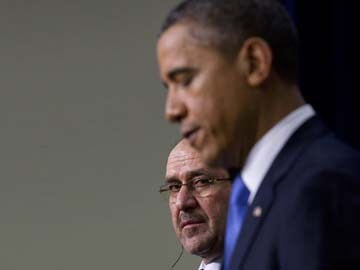
FILE -- President Barack Obama with Iraqi Prime Minister Nouri al-Maliki a joint news conference at the White House, in Washington, Dec. 12, 2011. Alarmed over the Sunni insurgent mayhem convulsing Iraq, the country’s political leaders are actively jock
Washington:
U.S. intelligence agencies have repeatedly warned top government officials that Iraq's Shi'ite Prime Minister Nuri al Maliki and his policies were gravely antagonizing his country's Sunni population, two U.S. security officials said on Friday.
The officials said the warnings were contained in secret intelligence reports and analyses presented in the last two years to policymaking officials, including President Barack Obama.
The reports concluded that Maliki and his government were creating so much animosity amongIraq's Sunnis that this would empower and embolden violent militant groups, such as the Islamic State of Iraq and the Levant.
Obama is sending 300 military advisers to Iraq to help stop the offensive by the Sunni militant ISIL and is demanding a more inclusive government be formed in Baghdad.
But he has stopped short of calling for the replacement of Maliki, who took over in 2006 during ferocious Sunni-Shi'ite violence three years after the U.S.-led invasion.
Intelligence agencies explicitly warned that Maliki's policies in recent years "alienated the Sunni population and gave ISIL space to operate," said a senior intelligence official, who asked for anonymity when discussing sensitive information.
Spy agencies also warned that Maliki was "failing to reconcile differences festering" betweenIraq's rival Muslim communities and said that all of Iraq's leaders needed to do more to address the growing sectarian tensions, the senior intelligence official said.
This contrasted with public comments by the Director of National Intelligence, James Clapper, who in his annual presentation to Congress on "worldwide threats" in January made only bland references to religious tensions in Iraq.
SECTARIAN APPROACH
Clapper said that Iraq's national elections this April would be a "pivotal event," and said: "The Sunni population in particular must be convinced that the elections will be fair in order to keep them committed to the political process and help check Iraq's rising violence."
Clapper added that Syria's protracted civil war was "destabilizing Iraq, hardening ethno-sectarian attitudes, and raising concerns about the spillover of violence."
The presentation did not mention Maliki by name or say that his government had contributed to the alienation of Sunnis although warnings in classified reports by U.S. agencies were intensifying about that time, the security officials said.
U.S. officials have been worried about Maliki's sectarian approach to governing and lack of action to reconcile with Sunnis since not long after he took office.
A former U.S. intelligence official said that while CIA director in 2006, retired General Michael Hayden told policymakers in briefings that Washington would be "asking a lot of Maliki and in one sense he's going to have to govern beyond his life experience."
The former official said that President George W. Bush held personal videoconferences every 10 days or so with Maliki to offer guidance. Obama stopped such conferences after he took office in 2009, the official said.
The officials said the warnings were contained in secret intelligence reports and analyses presented in the last two years to policymaking officials, including President Barack Obama.
The reports concluded that Maliki and his government were creating so much animosity amongIraq's Sunnis that this would empower and embolden violent militant groups, such as the Islamic State of Iraq and the Levant.
Obama is sending 300 military advisers to Iraq to help stop the offensive by the Sunni militant ISIL and is demanding a more inclusive government be formed in Baghdad.
But he has stopped short of calling for the replacement of Maliki, who took over in 2006 during ferocious Sunni-Shi'ite violence three years after the U.S.-led invasion.
Intelligence agencies explicitly warned that Maliki's policies in recent years "alienated the Sunni population and gave ISIL space to operate," said a senior intelligence official, who asked for anonymity when discussing sensitive information.
Spy agencies also warned that Maliki was "failing to reconcile differences festering" betweenIraq's rival Muslim communities and said that all of Iraq's leaders needed to do more to address the growing sectarian tensions, the senior intelligence official said.
This contrasted with public comments by the Director of National Intelligence, James Clapper, who in his annual presentation to Congress on "worldwide threats" in January made only bland references to religious tensions in Iraq.
SECTARIAN APPROACH
Clapper said that Iraq's national elections this April would be a "pivotal event," and said: "The Sunni population in particular must be convinced that the elections will be fair in order to keep them committed to the political process and help check Iraq's rising violence."
Clapper added that Syria's protracted civil war was "destabilizing Iraq, hardening ethno-sectarian attitudes, and raising concerns about the spillover of violence."
The presentation did not mention Maliki by name or say that his government had contributed to the alienation of Sunnis although warnings in classified reports by U.S. agencies were intensifying about that time, the security officials said.
U.S. officials have been worried about Maliki's sectarian approach to governing and lack of action to reconcile with Sunnis since not long after he took office.
A former U.S. intelligence official said that while CIA director in 2006, retired General Michael Hayden told policymakers in briefings that Washington would be "asking a lot of Maliki and in one sense he's going to have to govern beyond his life experience."
The former official said that President George W. Bush held personal videoconferences every 10 days or so with Maliki to offer guidance. Obama stopped such conferences after he took office in 2009, the official said.
© Thomson Reuters 2014
Track Latest News Live on NDTV.com and get news updates from India and around the world

